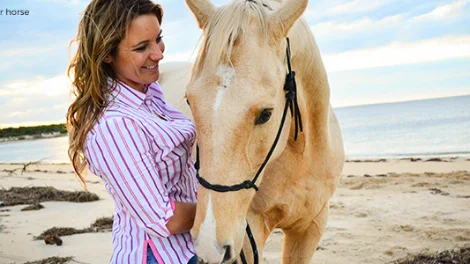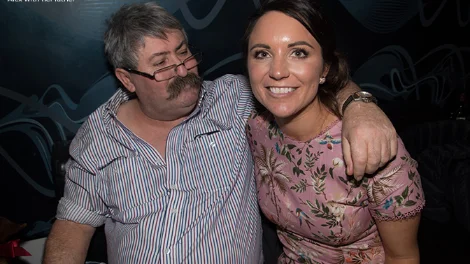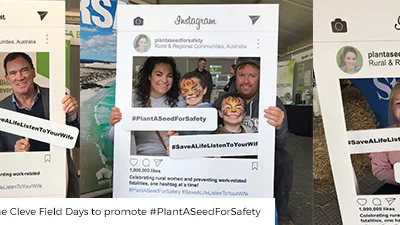


Inspired by events in her own life, Alex Thomas has embarked on a personal mission to change the conversation around health and safety in Australia’s rural industries.
In the process, she has developed a unique on-farm and in-business rural consultancy that could save lives. Growing up on a property in the north east pastoral district of South Australia, Alex has frst hand experience of the risks involved with work on the land. “When I was a child, dad was diagnosed with Q fever,” Alex said. “That, combined with the cumulative impact of so many dry years between 1982 and 2000, led to the breakdown of my parents’ marriage and the sale of our station when I was 16.”
The changes in circumstance would have a transformative impact on the direction of Alex’s life. Alex followed her father, Chris, to Roxby Downs after finishing school to work in health and safety in the mining industry. “About four years into my career at Olympic Dam, I recall Dad’s frustration around the emphasis that was being placed on paperwork and box ticking in work health and safety,” she said.
“Even though there were plenty of policies, procedures and other documents in place, they weren’t necessarily delivering safer outcomes for people.”
After participating in a work health and safety (WHS) leadership programme run by a group of organisational psychologists, Alex learnt of the importance of the ‘people factor’ in WHS – sparking her interest in “doing safety differently”.
“Safety is really important to me because of my journey with Dad, and given I had the connection to the land, I always wanted to provide that service back to rural industries.
“So, when the Global Financial Crisis hit the mining industry, I saw the opportunity to start my own WHS business to serve various rural enterprises across the country.
“Unlike mining, a lot of rural and agricultural organisations and businesses can’t afford the fulltime overhead of an in-house safety professional – let alone one that misses the brief on ‘keeping it practical’.
“I can provide a cost effective strategy that not only makes sense for farmers, but that they can work on by themselves… without the need for ongoing service fees.”
#PlantASeedForSafety
Alex has been running her own WHS consulting business, Alex Thomas Pty Ltd, since 2010. Last year, she was recognised for her work in the field as the recipient of the 2018 AgriFutures Rural Women’s Award (SA).
Using the Award’s $10,000 bursary, Alex launched the #PlantASeedForSafety campaign, a social media campaign that looks to disrupt the current narrative around WHS.
“I want to help people move on from box ticking and paperwork, to a more simple, straight talking way of managing risk and preventing people from getting hurt in rural industries,” Alex said.
As part of the campaign, Alex is highlighting the impact rural women can have in delivering practical WHS solutions, by profiling 100 rural women for the #PlantASeedForSafety website.
“I try and combine my own personal narrative with a sense of humour and a compelling call to action to engage rural men and women to do WHS differently,” she said.
“A part of that is recognising that rural women are so influential in this space.
“In my experience, rural women are innate carers and offer a fresh set of eyes given they haven’t necessarily been ‘doing it this way for years’.
“They may have worked in other workplaces and had greater exposure to WHS, and there is plenty of evidence to suggest that they’re often more risk averse.
“Unfortunately, rural women are often left carrying the bundle should their significant other be hurt on the property, and they’re also often playing a big administration role in the business – and rightly or wrongly, that’s where WHS usually sits.
“Rural women are often the closest observer of the work being done – yet they’re slightly removed and are able to offer an external perspective. They are also experts in their partner’s personality and work-life, their business and their community.
“They’re in the perfect position to start a conversation for change.”
Managing the WHS mindset
Rural industries are faced with some of the highest work-related fatality
statistics in Australia.
According to Safe Work Australia, from 2003 to 2016 Australia’s agriculture, fisheries and forestry industries accounted for 23 per cent of all work-related fatalities – 93 per cent of which were men.
“Part of being human means we have the propensity to habituate – to save time and energy by doing something the same way over and over again – unless experience tells us otherwise.
“For farmers, this can result in a ‘if it’s not broken, don’t fix it’ attitude towards WHS.
“In my experience, it seems that when farmers think about ‘compliance’ with WHS legislation – they think of penalties, policies and procedures.
“Essentially, it is viewed as an overwhelming mess of bureaucracy.
“This can be perceived as costly and convoluted, and that it just doesn’t make sense in the context of smaller family farming enterprises, nor is it directly related to the actual prevention of injury.”
Alex hopes that through the #PlantASeedForSafety campaign, farmers will start sharing their own practical solutions and WHS strategies, rather than “letting anyone and everyone who has very little to do with farming be the voice for how farmers manage health and safety.”
“Really, we just need farmers to start a conversation, to tell stories and to raise each other’s awareness of the risks and how they could be managed safer and better,” she said.
Developing good WHS practices on farms
“Ensuring your farm has good WHS practices in place can start with something as simple as a staff morning tea and chat,” Alex said.
“Family farming enterprises are really good at sharing stories about what’s working well, what’s not working well and about what could be done better.
“A casual catch-up around the kitchen table to nut-out what could go wrong on the farm and how to prevent that from happening is a great place to start when it comes to improving WHS.
“From these conversations, there are heaps of really simple things that can be implemented, and the mere fact that they’re not necessarily focussed on box ticking means they’re probably more effective at preventing people from getting hurt.
“It could be something as simple as putting a fence around a dam, a snakebite kit on every motorcycle, ensuring that all the UHF radios are in good working condition, or checking that all the brakes in the loader are functional.
“The busiest times on the farming calendar – harvest and seeding – are often the most dangerous times,” Alex says.
“Working long hours often in the dark, we simply don’t have the mental capacity to see and manage everything going on around us, so naturally we’re going to miss things.
“So, if you’re tired, make sure you get enough rest. If you have to keep going, be very deliberate in stopping to check on things and to make sure you’re attuned to what’s going on around you – unusual noises, smells.
“Keep an eye out for each other and be prepared to tell your mates to slow down.
“At the end of the day, all you need to do is do your best to manage the risk. Make a conscious effort to sit down with the people around you and talk about what could go wrong, how it could go wrong, and what you’re going to do about it.
“Most importantly don’t put it off until tomorrow – do something today.”
Find out more about Alex Thomas and the #PlantASeedForSafety campaign by visiting plantaseedforsafety.com